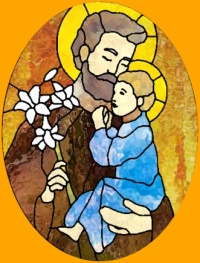Saint Joseph Medal, Rosary, Chaplet, Gifts
St. Joseph is widely credited within the Catholic faith as the
patron saint of fathers, families, tradesmen, craftsmen, working
people. St. Joseph is the patron saint against hesitations and
doubts. Pictures usually portray a man of patience and perseverance
and steady work, with tools as a symbol of St. Joseph.
The most common St. Joseph medal depicts him on the right
hand side holding a lily and Jesus on the left side, probably
about two or three years old. These are generally either round
or elongated. The word SAINT is over Jesus’ head on the
border on the left side while the word Joseph is over Saint Joseph's
head on the top right border. The lettering is usually raised
lettering on scale with the overall appearance of the medal. Underneath
the child Jesus and Saint Joseph image is “Pray for Us.”
These traditional medals make a great gift at First Holy Communion
and at Confirmation. The St. Joseph medal is a wonderful
Christmas gift or a birthday gift, or gifting to a person with
a special devotion to St. Joseph. A medal on St. Joseph’s
feast day (March 19) to mark the occasion is always appropriate,
especially for people of Italian heritage who have a wonderful
tradition of prayer
to St. Joseph and a feast with family and friends.
Color printed imaging of St. Joseph and child Jesus are readily
available particularly on the internet. The picture is very much
dignified by linen, giving a soft quiet look that invites pause
and some reflective thought, about life or about Saint Joseph's
life and patronage. These have been known to become a sought-after
family heirloom.
Here is St. Joseph art in a bit different usage. The Saint Joseph
icon magnet. These are inexpensively available with nice images
of St. Joseph. Many people hang these magnets on the refrigerator,
home computer, in the bedroom, cubicle at work, or in a vehicle.
A different St. Joseph icon is the holy water font. These are
available in cast plaster, clay or glazed ceramic with vivid colors.
Also available is the full size ceramic tile. St. Joseph the worker
in the woodshop with Jesus is the dominant tile, but others can
be custom made for the personal tribute.
 |
A scapular is two pieces of wool fabric with a picture on each,
with a long loop of string to be worn around the neck. Generally
worn beneath the clothing each cloth has a picture, one piece
worn on the chest area the other fabric piece worn on the back.
The traditional Catholic St. Joseph scapular is two pieces of
gold color fabric. The fabric worn on the front has “St.
Joseph, Patron of the Church, Pray for Us”. The rear fabric
has an image of the papal crown and keys with “The Spirit
of the Lord is his guide.”
There is a specific prayer to St. Joseph over 1900 years old.
There is strong belief by many that if recited daily for nine
consecutive days your prayer wish will be granted. This prayer
has been recited over the centuries as combatants prepared to
battle. The belief is that whoever carries the Saint Joseph prayer
will never drown or die suddenly, nor will the person be poisoned,
burned in a fire, captured by the enemy, and will not be defeated
in battle. The prayer to St. Joseph is available in books about
the saints and a scroll sized for framing or kept in the bible
or personal prayer book used frequently.
The St. Joseph rosary is a must for a person that prays
regularly to the patron saint.
The rosary is different from the traditional Catholic Holy Rosary,
yet it is also recited on a set of beads organized in seven sets
of seven separated by a larger bead. The St. Joseph chaplet
is recited on the seven sets of beads, petitioning St. Joseph
to help us gain in the seven virtues. Also available are St. Joseph
rosary and instruction booklets for reciting the St. Joseph chaplet.
The first two sets of beads petitioning Saint Joseph are the seven
gifts of the Holy Spirit. The fruits of the Holy Spirit are those
virtues and characteristics that show in a person's life as a
result of the Catholic Sacrament of Confirmation. There are a
couple of scripture passages that have different numbers of gifts,
the usual being either nine or twelve. The differences arise in
the count of acts of laying on hands, as well as different words
that describe the same trait, such as: gentleness versus mildness.
Items three through seven in the chaplet of St. Joseph recitations
hit upon the Fruits of the Holy Spirit.
Join us on

|